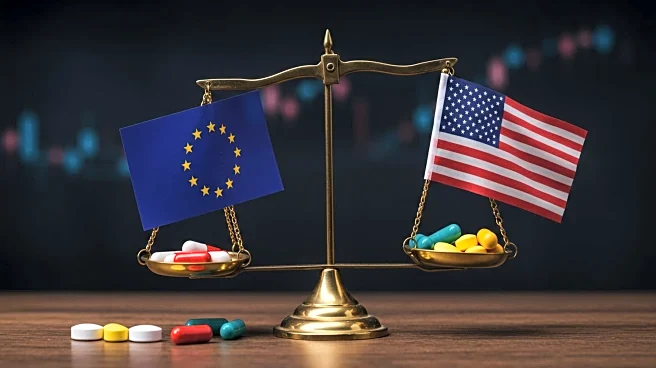What is the story about?
What's Happening?
President Trump has announced a 15% tariff on all pharmaceutical exports from the European Union, a move that could significantly impact the global supply chain of Botox, a product largely manufactured in Westport, Ireland. The town is home to a major facility operated by AbbVie, which produces both therapeutic and cosmetic Botox. The U.S. is the largest market for these products, accounting for 70% of the plant's turnover. The tariffs are part of Trump's broader strategy to bring pharmaceutical manufacturing back to the United States, a move that has created uncertainty and concern in Westport, where the plant is a major economic driver.
Why It's Important?
The imposition of tariffs on EU pharmaceuticals could lead to increased drug prices in the U.S., potentially adding $13 billion annually to healthcare costs. This could affect consumers through higher insurance premiums and drug prices. The tariffs also pose a threat to the economic stability of Westport, Ireland, where the AbbVie plant is a key employer and community supporter. The broader implications include potential disruptions in the pharmaceutical supply chain and challenges in reshoring drug manufacturing to the U.S. due to high costs and regulatory hurdles.
What's Next?
The tariffs could escalate to 250% over the next 18 months if the U.S. determines that foreign drugs threaten national security. This could further strain U.S.-EU trade relations and impact global pharmaceutical markets. AbbVie and other drugmakers are likely to increase U.S. investments in response to the tariffs, but the feasibility of relocating production remains uncertain. The situation could lead to prolonged negotiations and adjustments in the pharmaceutical industry, with potential impacts on drug availability and pricing.
Beyond the Headlines
The tariffs highlight the complexities of global trade and the challenges of balancing domestic manufacturing goals with international economic dependencies. The situation underscores the potential for political decisions to have far-reaching effects on local communities and global industries. It also raises questions about the sustainability of current trade practices and the need for strategic planning in the face of geopolitical shifts.















